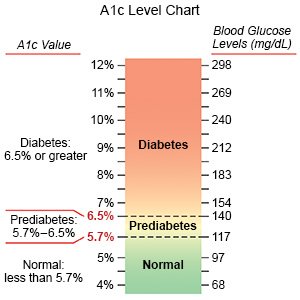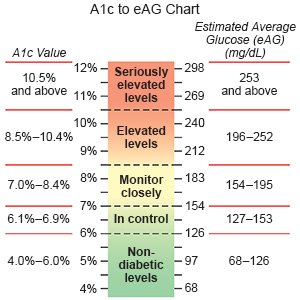Hemoglobin A1c
Medically reviewed by Drugs.com. Last updated on Apr 6, 2025.
What is a hemoglobin A1c test, and why do I need one?
A hemoglobin A1c is a blood test that measures your average blood sugar level for the past 2 to 3 months. It is also called an HbA1c or glycohemoglobin test. An A1c test can help diagnose prediabetes or diabetes. It can also tell you how well your diabetes plan is working. A1c testing can help your healthcare provider make changes to your treatment plan. These changes can help improve or control your blood sugar levels. Good control of your blood sugar levels can decrease your risk for problems caused by diabetes. Examples include heart attack, stroke, blindness, kidney disease, and neuropathy (nerve problems).
What increases my risk for diabetes?
You may need an A1c test if you have any of the following risk factors for diabetes:
- Heart disease
- High blood pressure
- Polycystic ovarian syndrome (PCOS)
- A first-degree relative with diabetes, such as a parent, sibling, or child
- Overweight or obesity
- Lack of physical activity
- Pregnancy or gestational diabetes in a past pregnancy
Who should get an A1c test?
Anyone who has known diabetes should get an A1c test as often as recommended by healthcare providers. The following should also get an A1c test:
- Adults with more body weight than recommended and 1 or more other risk factors for diabetes
- Adults 45 years or older, to have a baseline reading in case diabetes develops later
- Children 10 to 17 years with more body weight than recommended and 2 or more other risk factors for diabetes
- Anyone with signs or symptoms of diabetes, such as increased thirst, slow-healing infections, or increased urination
- Anyone in the first trimester of pregnancy who had diabetes diagnosed with a glucose test
Drugs used to treat this and similar conditions
Lyrica
Lyrica is used to control seizures, treat nerve pain and fibromyalgia. Learn about side effects ...
Eylea
Eylea is used to treat several retinal disorders, such as neovascular (wet) age-related macular ...
Omvoh
Omvoh is used to treat moderate to severe ulcerative colitis or Crohn's disease in adults. This ...
Reglan
Reglan (metoclopramide) is used to treat heartburn caused by gastric reflux. Includes Reglan side ...
Ozurdex
Ozurdex is an implant injected into the eye to treat swelling that may occur when there is a ...
Lucentis
Lucentis is used to treat the wet form of age-related macular degeneration. Learn about side ...
Plavix
Plavix (clopidogrel) is used to prevent blood clots after a recent heart attack or stroke. Includes ...
Glucagon
Glucagon injection is used to treat low blood sugar and to stop stomach movement during x-ray ...
Simethicone
Simethicone systemic is used for endoscopy or radiology premedication, functional gastric disorder ...
What do the results of an A1c test mean?
The results are given in percentages.
- If your healthcare provider is trying to diagnose diabetes:
- An A1c of 5.6% or lower means you do not have diabetes.
- An A1c of 5.7% to 6.4% means you are at risk for diabetes. This is also called prediabetes.
- An A1c of 6.5% or higher means you have diabetes.
- If you currently have diabetes, your A1c goal may be 8% or lower. Your healthcare provider will decide what your goal should be. This decision is based on your diabetes history and other medical conditions. You may need an A1c test 2 to 4 times each year, depending on your blood sugar level control.
 |
How should I prepare for the test?
You do not need to do anything to prepare for the test. Wear a short-sleeved or loose shirt to the test. This will make it easier to draw your blood. Other tests may be needed to diagnose or monitor diabetes if you have certain conditions. Tell your healthcare provider if you have any of the following:
- Iron-deficiency or B12-deficiency anemia
- Cystic fibrosis
- Recent heavy blood loss or a blood transfusion
- Recent erythropoietin therapy
- Sickle cell disease or thalassemia
- Kidney failure or liver disease
What will happen after the test?
Schedule a follow-up appointment with your healthcare provider to talk about your test results.
- If your A1c is lower than your goal , your medicines may be changed.
- If your A1c is at your goal , you may not need any changes to your diabetes treatment plan.
- If your A1c is higher than your goal , you may need changes to your medicines, eating plan, or exercise plan.
What else should I know about an A1c test?
- You may get an estimated average glucose (eAG) with your A1c results. The eAG gives your A1c result in numbers like you see on your glucose meter. For example, an A1c of 6% will be reported as an eAG of 126 mg/dL. This means your average blood sugar level was 126 mg/dL over the last 2 to 3 months. The eAG can help you understand if your A1c result is on target for what your healthcare provider recommends.

- You are at risk for an uncommon type of hemoglobin if you are African, Mediterranean, or Southeast Asian. This type of hemoglobin can affect your A1c test results. Tell your healthcare provider if you come from any of these backgrounds. You may need to have your A1c sent to a lab with certain equipment. This will help make sure your results are accurate.
Care Agreement
You have the right to help plan your care. To help with this plan, you must learn about your lab tests. You can then discuss the results with your healthcare providers. Work with them to decide what care may be used to treat you. You always have the right to refuse treatment.The above information is an educational aid only. It is not intended as medical advice for individual conditions or treatments. Talk to your doctor, nurse or pharmacist before following any medical regimen to see if it is safe and effective for you.© Copyright Merative 2025 Information is for End User's use only and may not be sold, redistributed or otherwise used for commercial purposes.
Learn more about Hemoglobin A1c
Care guides
Further information
Always consult your healthcare provider to ensure the information displayed on this page applies to your personal circumstances.
